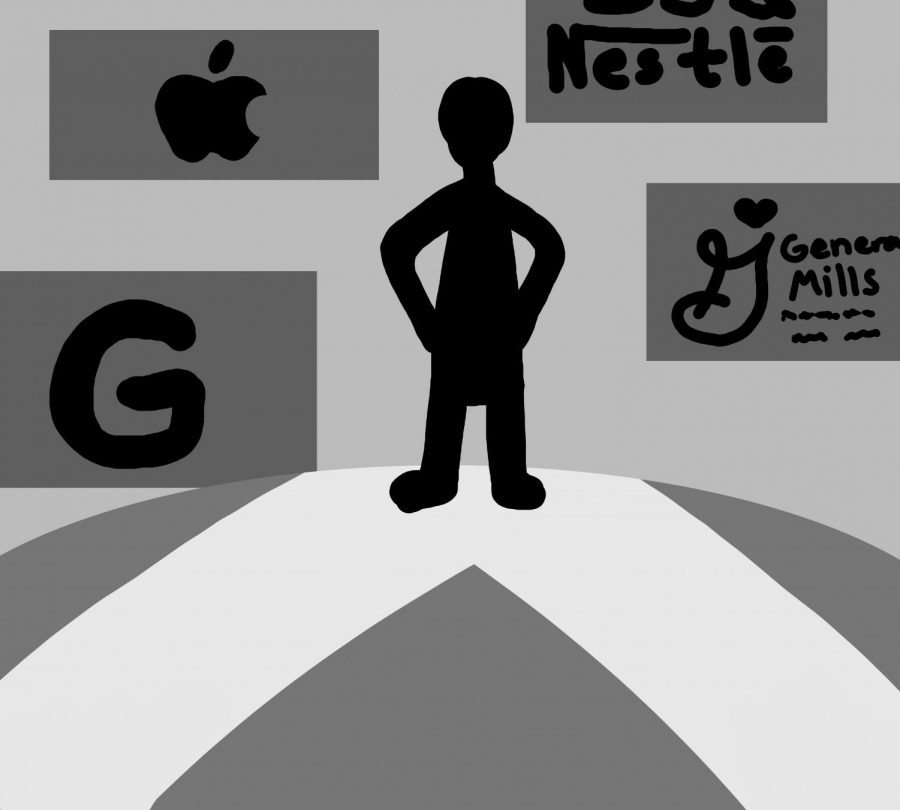Are corporate monopolies killing choice?
February 20, 2020
Walk into your local Safeway and look at what’s on the shelves and in the fridges. Although there’s a large variety of foodstuffs and beverages bearing the insignia of many brands, most of these products are owned by just a few giant monopolies. Pepsi and Coca-Cola both own 69.5% of soda and soft drink products. Proctor and Gamble owns shampoo brands like Aussie and Herbal Essence, laundry detergents like Tide, Gain and Downy, and even Pampers. Brands that you wouldn’t associate with each other are often owned by the same monopoly. This is detrimental for the consumer’s choice to support corporations that align with their tastes and morals.
Say, for example, someone decides to swear off Nestlé products for a moral reason, whether it be the way they block water access for millions or because they use child labor on their chocolate plantations. They avoid Nestlé’s bottled water or Nesquick or anything that bears Nestle’s name. However, they may buy Häagen-Dazs or Fancy Feast or Lean Cuisine later that week, which are all owned by Nestlé. A corporation can own many properties that you may not associate with it. It’s not always that obvious; the Nestlé logo isn’t printed in a clear, obvious spot on a Häagen-Dazs tub of ice cream. A consumer could be inadvertently supporting a corporation that they don’t wish to support.
Monopolies effectively eliminate competition. There really isn’t any competition between two brands owned by the same corporation; you support them either way when you buy any of their products. The same goes for airline companies, newspaper and media conglomerates, and pharmaceutical monopolies. They control the prices at which you purchase things and the information you intake. And, as monopolies continue to grow wealthier, small businesses without the power, wealth and influence of these monopolies lose business or are bought out. Monopolies control the wages their employees receive. They have incredible power to lobby representatives to support their agenda.
With this in mind, are we truly free in this economy? If, at every turn, we support these monopolies, then what’s the point? Are we just slaves to continue filling the pockets of a small percentage of billionaires? I suppose that is their intention, and that’s why they continue to raise prices on insulin, lower wages and limit our information intake. But, maybe there is a choice, and that choice lies in local businesses. If we buy produce from a farmer’s market, or shop at mom-and-pop stores, we’re not supporting those big businesses, right? But even then, they have a hard time competing with big monopolies and every so often, we have to get something at Walmart or Safeway that we can’t find in a lot of local businesses. So, what should we do?
I believe that we need another antitrust movement, one that works to break up giant monopolies and decrease their influence on the government, economy and society, similar to those in the early 20th century. Monopolies have gotten too big and dominate too much of our lives and too many of our products. If our politicians would work to split these monopolies, like how the Standard Oil Company was split into 34 companies, we may be able to restore choice and freedom to the consumers in this market.







Kyle Hill • Jun 14, 2020 at 11:01 pm
Now we are on a solar minimum that keeps looking like it’s going to stop and as soon as we think cycle 25 is coming it stops and we keep racking up spotless days. Now the world is in a cooling trend reacting to it after a delay (a long delay). Last month was record warm everywhere and now everything is cooling.
Kyle Hill • Jun 14, 2020 at 11:00 pm
Microsoft under Windows 8 tried to make their own virtual machine called Virtual PC and then later XP mode but they largely abandoned it. It had a lot of potential if they could incorporate some kind of older Direct 3D or some kind of graphics card emulation in it and Sound Blaster.
These companies are sitting on huge gold mines if they opened their eyes and ears. They instead have bricks but alas this is predicted in Revelations and Isaiah many times. We are literally there.
The solar eclipse of 2017 had a lot of ‘astronomy’ stuff happen before and after that filled a lot of major prophecies that pushed us very much forward.
Kyle Hill • Jun 14, 2020 at 10:57 pm
Dad knew about this back in the early 00s. This has been a LONG ongoing problem. The media (especially under Obama) hid all the news about it favoring showing his face and now hating Trump if he sneezes too loudly!
We have the blame for letting it happen.
This is why a lot of good games have potentials for being remade but aren’t like New Adventures of The Time Machine owned by other companies now that have nothing to do with gaming.
Educational games are in this state too that have good potential. The reason they lacked sales is because most do NOT work on 64 bit though some do with tinkering and/or virtual machines but for most people that is a lot of work to get one legacy thing going.
The companies were not informed this that made these so have no !@!@# idea what stopped their sales so they blame piracy,digital sales,blah blah blah but digital sales suffer thru this too!